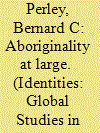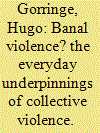| Srl | Item |
| 1 |
ID:
075860


|
|
|
|
|
| Publication |
2006.
|
| Summary/Abstract |
Maliseet is one of many Canadian aboriginal languages that are projected to become extinct within the next twenty years. This article examines the events surrounding Maliseet language instruction that contributed to enactments of resistive strategies that corresponded to varieties of power relations-a process I call aboriginality. The local acts of resistance are situated in the Canadian nation-state ideology of "two founding cultures." I argue the local acts of resistance challenge local asymmetrical power relations while also addressing nation-state ideologies of dominance and coercion. Initially, the focus of resistance was confined to local domains, but over a period of three years, resistive strategies changed to confront global dominance and coercion. I argue the implications of such shifts in strategies and scales of resistance reflect an "aboriginal social imaginary," which holds promise for the survival of aboriginal languages as well as meaningful participation in the "modern social imaginary" called modernity
|
|
|
|
|
|
|
|
|
|
|
|
|
|
|
|
| 2 |
ID:
075862


|
|
|
|
|
| Publication |
2006.
|
| Summary/Abstract |
Outbursts of collective violence are often (understandably) met by expressions of outrage or condemnation. 'How is it,' accounts muse, 'that ordinary people can commit such atrocities?' This article argues that an exclusive focus on the violent act can contribute little to our understanding. Instead, it seeks to elucidate the routine processes and actions that serve to render violence acceptable (even banal) as a mode of action. Exclusive identities and a powerful rhetoric of honour, pride, and shame persuade people that violence is either desirable or even necessary in a given context. Following Billig's account of banal nationalism, I argue that grasping these mundane day-to-day processes is essential for an understanding of collective violence. The article draws on research amongst caste-based movements in South India to support this argument.
|
|
|
|
|
|
|
|
|
|
|
|
|
|
|
|
| 3 |
ID:
075861


|
|
|
|
|
| Publication |
2006.
|
| Summary/Abstract |
This article examines the discursive and material presence of the "rural" in the "urban," relating it to the historical and contemporary production of African American culture and identity. By using the case of the Great Migration, it discusses how African Americans negotiated and shaped their urban surroundings and formed individual and collective identities by drawing on their rural, southern histories. It then suggests the relevance of these broad historical processes to contemporary analyses and interventions in the urban environment of Baltimore, Maryland. This article challenges assumptions that obscure the agency of urban residents in the formation of identity and the establishment of community. It demonstrates ways in which the historical movement from rural South to urban North was accompanied by a range of cultural resources that have been adapted, discarded, or reconstructed.
|
|
|
|
|
|
|
|
|
|
|
|
|
|
|
|